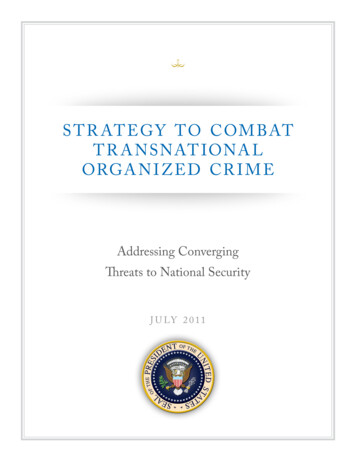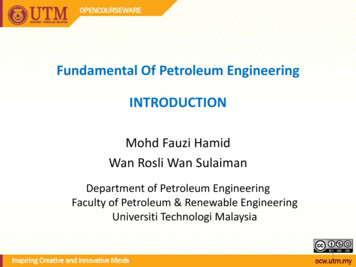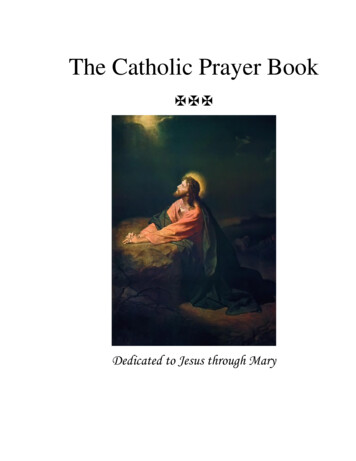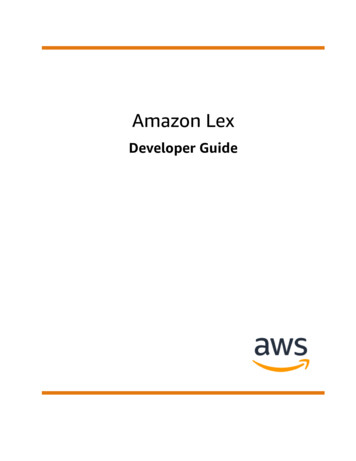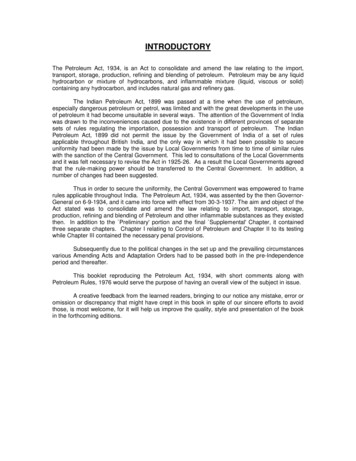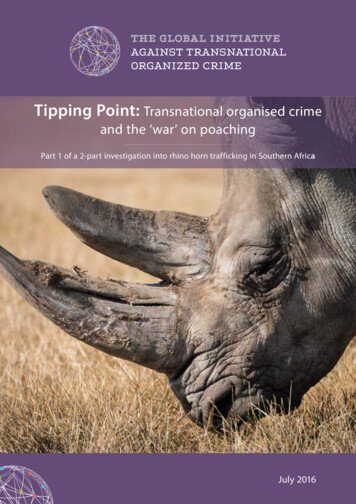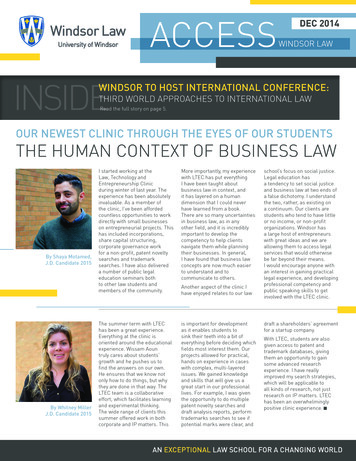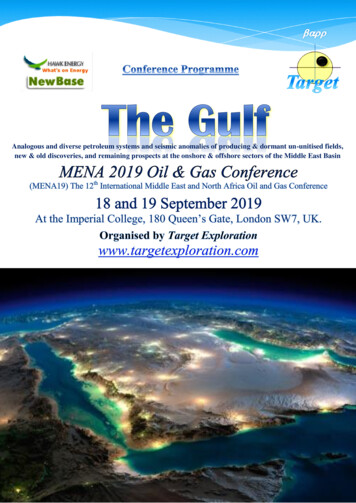
Transcription
Transnational Petroleum Law/Prof. CárdenasSYLLABUSTransnational Petroleum Law ((LexLex Petrolea)Petrolea)Time: 2:30pm-4:00pm M-WLocation: Check on the websiteProfessor Julián de CárdenasEmail: jcardena@central.uh.eduOffice: 713.743.2267 Office: 126-BLBOffice Hours: Wed. 10:30 a.m. – 12:00 p.m. or byappointmentCOURSE OVERVIEWToday, we are living two relevant challenges impacting the legal practice in the hydrocarbonsindustry: 1. the development of a specialized transnational law system for the oil and gas sector, and2. the concentration of dispute resolution in transnational arbitration and litigation. Thesechallenges require a better understanding of the transnational regulation applicable to petroleumtransactions in order to improve strategies for structuring and performing upstream, midstream anddownstream operations, and to litigate before arbitration tribunals or national and internationalcourts. Hence, this course will feature the transnational petroleum law method that provides thetools to work in the transnational regulatory environment that governs investments in the oil and gasindustry worldwide.Transnational petroleum law or lex petrolea is conceived as the rules of law and the transnationallegal order created by the transnational petroleum community constituted by States, corporations,professional industry associations and other industry actors, participating in the oil and gas sector.Therefore, the course will focus on the transnational rules commonly associated with the petroleumindustry such as: investment protection standards included in international investment treaties,industry standards and best practices, general principles of international law, model contracts, andarbitration jurisprudence. All these sources of law have a common element which is theirtransnational legal nature that makes them to transcend parties agreements and the regulationenacted by oil and gas producing States. Indeed, this plurality of sources of law is consideredaltogether “the network” that governs transnational petroleum operations in the 21st Century.A decentralized system of regulation can raise a lot of questions regarding legal certainty and therule of law. However, the appropriate identification of the relevant rules and their context ofapplication, will demonstrate that transnational rules do not act and exist in isolation. In fact, theyare integrated into the context of the global activities of the oil and gas sector with great coherence.Thus, the transnational petroleum law approach will provide you with the tools to identify, classify,define, use and to enforce these transnational rules when they are implemented in transnational oiland gas transactions, or in cases of transnational arbitration and litigation connected with the oil andgas sector.The course will also provide model contracts, standardized regulation and a collection of excerpts ofarbitral awards in the oil industry which will guide our understanding of the new legal practices in theoil and gas sector. The cases under review will cover oil and gas arbitration in Latin America, NorthAmerica, Europe Asia, Africa and the Middle East. For example: cases of international arbitrationrelated to expropriation or indirect expropriation in Russia, Venezuela and Ecuador; the use ofindustry best practices in Nigeria, Sudan, Mexico and Canada; the protection of foreign investmentsin the case of armed conflicts (Libya, Sudan, and Colombia); the imposition of sanctions against theoil industry in Rusia, Libya, and Venezuela, and environmental litigation related to petroleuminvestments.Page 1 of 11
Transnational Petroleum Law/Prof. CárdenasSKILLS PROVIDED BY THE COURSEThe course will provide tools to develop legal skills acting as in-house counsel or as transnationalattorney in the petroleum industry, such as:1) To recognize petroleum industry best practices from State and Non-State sources of law applicableto petroleum investment projects, based on the review of petroleum contracts, petroleum industrystandards, and arbitration awards.2) To identify new trends in transnational compliance and litigation involving international petroleuminvestments, in order to improve expertise on risk allocation, investment protection, and regulationof foreign investments.3) The practice of International Investment Treaties and the most relevant investment arbitration rulessuch as ICSID, ICC, and UNCITRAL rules.4) To identify and work under the environment of transnational legal orders of globalized economicsectors.5) To build a global perspective of petroleum regulation through international investment treaties andbest practices.EVALUATION50% - Research paper 12-15 pages (due at the end of semester). Research Paper: The paper willfocus on a case study related to the oil and gas industry.50% - Exam: Evaluation testing the use of international investment standards. Take-home finalassigment.Arbitration Case: Before Spring Break it will be distributed a file for a legal discussion over aninternational arbitration case involving a petroleum service contract in a Latin American Country.Research Paper: Each student will write a 10- 12 pages term paper (4,000 words) on a topic related toregulatory oil & gas issues in an oil producing country and transnational legal issues. The professorwill provide the list of topics.Additional Inforation: Counseling and Psychological Services (CAPS) can help students who arehaving difficulties managing stress, adjusting to the demands of a professional program, or feelingsad and hopeless. You can reach CAPS (www.uh.edu/caps) by calling 713-743-5454 during and afterbusiness hours for routine appointments or if you or someone you know is in crisis. No appointmentis necessary for the “Let's Talk” program, a drop-in consultation service at convenient locations andhours around campus. http://www.uh.edu/caps/outreach/lets talk.htmlPage 2 of 11
Transnational Petroleum Law/Prof. CárdenasPROFESSOR’S BIOGRAPHYJulian de Cardenas GarciaResearch Assistant Professor of LawProfessor Cardenas joined the University of HoustonLaw Center in 2012 as an Energy Scholar and VisitingProfessor at the Environment, Energy and NaturalResources Center (EENR Center), focusing ontransnational oil and gas transactions. At UHLC heteaches the courses Transnational Petroleum macy and Geopolitics of Oil and Gas; and GlobalO&G Service and Procurement Agreements. As avisiting professor, he has taught investment law andarbitration in the O&G sector, and O&G industrypractices at the Universidade do Estado do Rio deJaneiro (UERJ) in Brazil; the Universidad Autónoma deNuevo León (UANL) in Monterrey, and the InstitutoTecnológico Autónomo de México – ITAM, in MexicoCity, Mexico; the University Paris Sud, France; and theUniversity Externado, in Bogota,Colombia.He frequently works with companies, public authorities, and governments in various areas of oiland gas law and policy. At the EENR Center, he is the coordinator of the "Inter-AmericanHydrocarbons Regulators Dialogue," an initiative conceived to create a nexus between nationalhydrocarbons agencies, the private sector, and the academia. Since June 2019, he sits on the AdHoc Administrative Board of Directors of Petróleos de Venezuela (PDVSA), the Venezuelan NationalOil Company.He is a conference speaker on transnational oil and gas law, investment law, internationalarbitration, best oil and gas industry practices, and oil and gas geopolitics. He has been a guestspeaker in conferences related to these issues in the U.S., Canada, France, Germany, Scotland,the Netherlands, Mexico, Brazil, Cuba, Costa Rica, Trinidad & Tobago, Ecuador, Colombia,Venezuela, Gabon, and Kuwait. Also, Professor Cardenas is frequently interviewed by media outletson Latin American affairs and oil and gas industry matters. Before joining the EENR Center, heworked as foreign legal clerk at the Arbitration Department of Dewey & Leboeuf, Paris, and alsoserved for nearly six years as a career diplomat for the Venezuelan Ministry of Foreign Affairs,working multilateral affairs with the Organization of the American States (OAS) and the UnitedNations (U.N.) and bilateral affairs on sovereign boundary issues. He works effectively in Spanish,French, and English, and has some working proficiency in Portuguese.He holds a law degree and a B.A. in International Relations from the Universidad Central deVenezuela; a Master of Laws in Arbitration and a Diplôme Superieur d'Université in Business Lawfrom the Sorbonne University - Paris II Pantheon-Assas; and an LL.M. with a Certificate in Energy,Environment & Natural Resources Law from the University of Houston Law Center. He was aDoctoral Fellow at the Research Center for Investment and International Trade Law (CREDIMICNRS) at the University of Bourgogne, Dijon, France.COURSE BACKGROUNDThe Transnational Petroleum Law Class started to be taught at the Law Center of the University ofHouston in January of 2013. The course was planned to provide an integration of transactional anddispute resolution approach in the study of petroleum investments. This approach is based on themethodology of transnational law created by the legal doctrine of the lex mercatoria developed byL’Ecole de Dijon and le Groupe de Beaune, and a vast research carried out at the University of HoustonLaw Center. The methodology is based on the notions of transnational rules and usages of thepetroleum sector and the existence of a transnational legal order of the petroleum industry. Thesetwo ideas allow legal practitioners in the oil industry to better understand the transnational regimethat governs petroleum transactions in the 21st Century.Page 3 of 11
Transnational Petroleum Law/Prof. CárdenasThis transnational approach has been also included in other programs on energy law at the UniversitéParis XI in France, Université de Versailles, the Universidad Autónoma de Nuevo León (UANL),Monterrey, Mexico and the Universidad del Externado in Colombia.Further, a number of conferences under this methodology have been delivered in around 15 countriesproviding to National Petroleum Agencies and Corporations, the information of this new practice ofthe law.READINGS:The readings for the class will be provided online. You will enter to a folder corresponding the day ofthe class and will have a library of readings. The files marked as “M” means Mandatory Readings. Thefiles marked as “R” means Recommended Readings. I will refer to both kinds of readings during theclass. The Folder entitled “X FILES” will provide complementary readings on the topics.Page 4 of 11
Transnational Petroleum Law/Prof. CárdenasCOURSE SCHEDULEFIRST PART – GENERAL ISSUES ON THE OIL INDUSTRY AND TRANSNATIONAL LAWWeek 1: Where we stand in the transnational legal scholarship of the petroleum industry?-Overview of the Schools of Legal Thought in Oil and Gas Law-Overview of the Transnational Petroleum IndustryWeek 2: The transit from international law to transnational law. The review of basic notions-Review of notions of International Law and Transnational Law (Sources of Law, Legal Order,Arbitration, Applicable Law and Globalization)-The legal regime of transnational sectors of the world economySECOND PART – THE CONSTRUCTION OF TRANSNATIONAL PETROLEUM LAWWeek 3: Transnational Law. A New Theory of Rules and Legal Order in the Petroleum Sector-Investment Contracts and Transnational Petroleum Contracts-Transnational Law and Transnational Petroleum Law.Week 4: The transnational rules applicable to petroleum investments-Review of Investment Treaty Standards applicable to Petroleum Investments-Review of Industry Standards applicable to Petroleum InvestmentsWeek 5: Arbitration in the Petroleum Sector-The Separability Doctrine and the Principle of Competence-Competence (Negative andPositive Effects)-Applicable Law rules by international arbitrators. The autonomy of arbitration: Autonomyregarding the applicable law and the legal regime and autonomy concerning the seat and theenforcement of arbitral awards.Week 6: The Arbitration Procedure-The Arbitration clause and the jurisdiction of an arbitral tribunal-The procedure on the merits. The arbitral award and the ways to challenge arbitrationawards. The transnational enforcement of an arbitration award (The U.S. and the Frenchapproach: The Putrabali v. Rena Holding case and the Chromalloy v. Egypt case under scrutiny)Page 5 of 11
Transnational Petroleum Law/Prof. CárdenasTHIRD PART – TRANSNATIONAL PETROLEUM LAW IN PRACTICEWeek 7: The legal regime of petroleum investments in Venezuela and Bolivia.Case under study: The Transnational Market of Investment Treaties-The legal regime of petroleum investments in Venezuela and Bolivia.-The practice of treaty shopping by oil and gas corporations. The protection of investments incase of denunciation of Investment Treaties and Conventions.Readings: Legal doctrine and excerpts from petroleum arbitration cases against Venezuela andBolivia’s investment treaty practiceWeek 8: The legal regime of petroleum investments in Ecuador and Russia.Case under study: The methods of direct and indirect expropriation in oil and gas arbitration-The legal regime of petroleum investments in Ecuador and Russia.-Direct expropriation in the oil and gas industry. Nationalization and Expropriation. Indirectexpropriation in the oil and gas industry. Expropriation through tax measures.Readings: Legal doctrine and excerpts from petroleum arbitration awards for investments in Russia(The Yukos case v. the Russian Federation) and Ecuador (The cases Occidental; Burlington; EnCana andDuke Energy against Ecuador).Week 9: Spring BreakWeek 10: Arbitration Week. How arbitrators Think about the appliable law?-Analysis on applicable law in an arbitration case distributed in class.-The rules for arbitrators on applicable law. The methods of applicable law in petroleumarbitration.Week 11: The legal regime for petroleum investments in Brazil and Nigeria.Case under study: The international oil industry standards in practice. Their use, applicable andenforceability.-The legal regime of oil investments in Brazil and Nigeria.-The incorporation of environmental best practices in national regulation, petroleumcontracts, and arbitration. The enforceability of industry practices by local courts or arbitrationtribunals.Readings: Legal doctrine and the review of Brazilian and Nigerian practices on environmental issues.Excerpts from judicial decisions dealing with environmental best practices: the BP Macondo case inthe U.S. and the Maria Aguinda Case v. Chevron in Ecuador. Excerpts from arbitration tribunals dealingwith environmental best practices: Aminol v. Kuwait and Niko Resources v. Bangladesh. The Sarayakucase before the Inter-America Court of Human Rights against Ecuador (Prior Consent).Page 6 of 11
Transnational Petroleum Law/Prof. CárdenasWeek 12: The legal regime of petroleum investments in Colombia, Sudan and South Sudan.Case under study: The standards of protection and security. The Protection of investments in caseof armed conflicts. Transnational rules of responsibility of corporations and corporate executives incases of violations of human rights and criminal law.-The Legal Regime of Oil Contracts in Colombia and South Sudan.-The Standards of protection of investments in case of armed conflicts. The risks ofcorporations to incur in violations of international criminal law. Multiple Jurisdiction oflitigation in cases of human rights and armed conflictsReadings: The case of petroleum investments in Colombia, South Sudan, and Nigeria. Nigerian casesunder the Alien Tort Statute in U.S. Courts.Week 13: The Legal Regime of Angola and Kazakhstan.Case under study: The standard of fair and equitable treatment and transfer of funds.-The Legal Regime of Angola and Kazakhstan.-The Standard of Fair and Equitable Treatment and Transfer of funds.Readings: Review of standards of FET and transfer of funds in bilateral investment treaties andarbitration decisions.Week 14: The legal regime of petroleum investments in Mexico. The Mexican Oil Opening.Case under study: The rules of transparency and fight against corruption. Do we have a rule oftransnational public order in the oil industry concerning corrupt practices?-The Legal Regime of petroleum investments in Mexico. The Oil Opening.-Arbitration and Corruption practices in the oil industry. Transnational public order in thepetroleum industry.Readings: Discussions on the transnational application of the Foreign Corrupt Practices Act and theBribery Act in the United States (local courts) and the scrutiny of corrupt practices by arbitrations(transnational dispute resolution)Week 15: Argentina Oil and Gas Regulation. Expanding and multilaterazing investment arbitration.-Argentina Oil and Gas Regulation. National Treatment and Most Favorable Nation Treatment.The Umbrella Clause.-Final remarks on transnational petroleum law and the lex petrolea.Readings: Legal Doctrine. Review of excerpts of arbitration awards in multiple jurisdictionsPage 7 of 11
Transnational Petroleum Law/Prof. Cárdenas1) Final Take-home assigment:Test on substantive principles of Investment Law and notions of transnational law and arbitration.Check the date of the final exam at the website of the University of Houston Law CenterPage 8 of 11
Transnational Petroleum Law/Prof. Cárdenas2) Research PaperYou may find in the text below ten suggested topics proposed to the class with a description orsuggestions of an outline to write the paper. The students can also suggest their own topic andoutlines that have to be approved by the Professor.The topics with a transnational law approach are the following:1. The consequences of denunciation of the ICSID Convention related to an oil investmentThis paper must address the different scenarios for a foreign investor in the oilindustry to find access to the jurisdiction of an international arbitration tribunalin cases where the host governments have denunciated the ICSID Convention.An analysis of the interpretation of articles 71 and 72 of the WashingtonConvention of 1965 are required.2. The consequences of denunciation of an investment treaty related to an oil investmentThis paper must address the different strategies that a foreign investor in the oilindustry may have in order to continuing having investment treaty protection.Questions related to survival clauses of investment treaties, Most FavorableNation clauses, the method of consenting to arbitration and treaty shoppingmust be discussed.3. The implementation of the best practices of the oil industry in Nigeria/ Brazil/ Colombia/Angola/ Kurdistan/ Mexico/ Libya/ Bolivia/ Norway/ Liberia/ Ghana/ UKThis paper should discuss the legal construction for the enforcement of bestpractices of the oil industry in one specific country from listed above or othercountry proposed by the student. Are best practices just voluntary practices?Are they enforceable because they are included in a contract? Are theyenforceable because they find direct application in the petroleum industry? Theanalysis shall include a review of arbitration rules and state law related to theapplication of usages. The review of national regulation, contracts and excerptsof arbitration awards is required for an adequate analysis. The paragraphs 502and 503 from the decision on jurisdiction Niko Resources v. Bangladesh (ICSID,2012) are relevant to the analysis.Page 9 of 11
Transnational Petroleum Law/Prof.Cárdenas4. Is the Windfall Profit Tax a transnational practice in the oil industry in the hands ofstates?Between 2005 and 2012 a number of oil producing States approved a kind of taxcalled the “Windfall Profit Tax” in order to increase the government take inpetroleum investments. Some players have argued that this practice meet aninternational standard that the State, as the owner of the non-renewableresource, "is to be the main beneficiary of extra revenue resulting from high oilprices.” What are the arguments to support this idea and the limits thattransnational law and contract practice may provide?5. The protection of oil investments in case of armed conflicts, the case of South Sudan?This paper must address the obligations of South Sudan to grant protection andsecurity to foreign investors in the oil sector in the country under an investmenttreaty and the applicable transnational law to foreign investors in the oil sectorsrelated to the performance of investments in places where armed conflicts aretaking place.6. Is treaty shopping a legitimate practice in the petroleum sector?This paper must write a comment on the decision of jurisdiction in the caseMobil Cerro Negro v. Venezuela 2010, decided by an ICSID tribunal presided byGilbert Guillaume. The comment must highlight, Why the practice of treatyshopping is considered a legitimate practice? And What limits have beendeveloped by arbitration practice? The paper shall make reference to othercases such as Phoenix Action, Tokios Tokeles, Tidewaters, among others.7. Transnational Legal Regime for oil investments inThis paper shall discuss the different sources of law applicable to a petroleuminvestment in an oil producing country. The paper must make reference to allpossible sources of law and the ways of interconnection between all thesesources of law through the practice of arbitration.8. The recent enforcement of stabilization clauses included in petroleum agreements inarbitration awards.Stabilization clauses have been always a controversial topic in oil and gasarbitration. Some authors consider these clauses unenforceable and only usefulto increase the bargaining power of oil corporations before oil producing states.However, recent arbitration decisions have provided guidelines on how theseclauses can be enforceable and how the amount of damages can be calculatedfollowing industry practices. Thus, the paper must describe these newdevelopments and analyze whether this is a practice that must continue to beimplemented in long term contracts in the petroleum industry.Page 10 of 11
Transnational Petroleum Law/Prof.Cárdenas9. Commentary of the Sarayaku case v. Ecuador before the Inter-American Court of HumanRights. The case of Prior Consent.The decision of 2012 issued by the ICHR in the case Sarayaku v. Ecuadorcontributed with guidelines in the implementation of prior consent by oilproducing countries. The decision was published on the website of the ICHR andthe question is whether this decision by an inter-state tribunal can affectcontract and industry practices in the petroleum sector around the world. Canthe Sarayaku decision be used as international case law an arbitration betweena State and an oil corporation? Could States non-members of the ICHR be“forced” to follow the standards developed by the decision? Are corporationsfollowing the new guidelines in other jurisdictions different than Ecuador10. Commentary on Yukos v. RussiaThis paper must address three specific questions: 1) How the arbitral tribunalcould rely on WikiLeaks cables to decide some issues in the award? 2) Indirectexpropriation through tax measures in violation of the Energy Charter Treaty and3) The reduction of compensation as a result of investor’s violation of nationallaw (contributory fault).Instructions:The paper must have a maximum of 4,000 words (without including footnotes) and must besent to the Professor the last day of the Spring Semester 2019 to the following email address:jcardena@central.uh.edu.Appointments:Any other appointment must be discussed with the Professor addressing an email to:jcardena@central.uh.eduPage 11 of 11
1) To recognize petroleum industry best practices from State and Non-State sources of law applicable to petroleum investment projects, based on the review of petroleum contracts, petroleum industry standards, and arbitration awards. 2) To identify new trends in transnational compliance and litigation involving international petroleum
